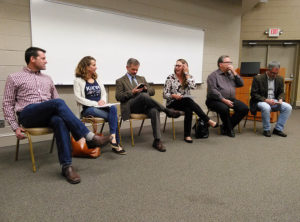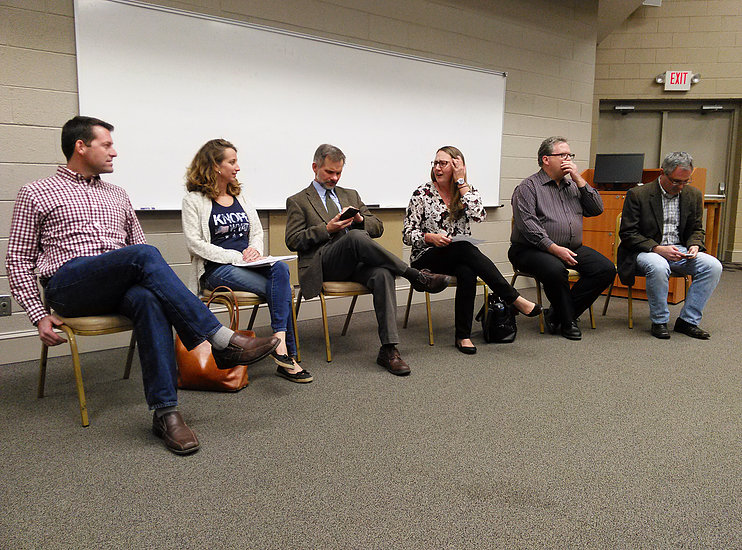Nearly 150 students gathered for the faculty panel discussion on the presidential election last Tuesday. Due to the surplus number of students, the event was moved from the SUB 7 to Hyder Auditorium and the discussion began just a few minutes after the planned starting time of 7:30 p.m.

The faculty panel was comprised of five professors: David Campbell, Jim Dahlman, Heather Hoover, John Jackson and Mark Peacock. Amy Edmonds served as the moderator for the discussion.
The first question Edmonds asked was, “How should the United States move forward with its immigration policy?”
Dahlman replied by saying he would like to see a pathway to citizenship.
“If you are looking for a simple, clear answer, you are looking in the wrong place,” he said. “Many of the 11 million immigrants have children, and, if they are deported, what happens to their children? Mass deportation would be a horror story on any level, and building a wall is impractical.”
Peacock agreed, saying he would like to see both security and a pathway to citizenship.
“I have a close friend who is an illegal immigrant,” Peacock said. “He is a volunteer firefighter and a father. He goes around saying, ‘I love America,’ and I think America is better because he is here.”
Peacock said he recognizes that there are some who want to bring our country great ill and, therefore, he also wants border control to prevent threats from walking in the country.
The panel was then asked what the United States’ responsibility means for the 20 million refugees.
“As a Christian, I would like to see our country be a world leader in compassion,” Dahlman said. “That doesn’t translate to open borders. There should be an application process and a check with intelligence agencies.”
Hoover said she would like to see other countries open up their borders to Syrian refugees.
“Lebanon is carrying the grunt of most Syrian refugees. The wealthy countries are not really helping. We should work to convince other countries to open up their borders.”
Campbell responded by saying, “Send them over, but we have to accept the risks.”
Edmonds then asked what the president should do about ISIS and other terrorist threats.
“Protect life and property,” Peacock said. “They should make sure not to import terrorists into the country.”
When asked what the United States’ role should be among other nations, Dahlman said the Unites States should be involved in the world and “play well” with others. He said the U.S. should see themselves as the richest among equals.
“I don’t know if we need to be in the business of nation-building or fixing, however, we will trade with you and open up borders.”
Jackson agreed and said retreating from trade is not a reasonable option.
The panel was then asked how much likability should matter when it comes to choosing the next president. Hoover responded by saying she would rather have a very knowledgeable president that she did not like instead of an “oaf” whom she did like.
“When we predicate our political decisions on likeability, we tend to ignore everything else,” she said. “I’m not sure we can get to policy when we start with ‘I like.’”
Edmonds then asked if not voting in the election was a wise option.
Campbell responded by saying he would recommend students look into the Libertarian party, “because they are logically consistent.”
One audience member then shouted, “Johnson doesn’t know what Aleppo is.”
In response Campbell said, “Yes, but is that really a fair assessment of him?”
Several members of the audience replied, saying that Johnson should have known.
“My 10-year-old knows where Aleppo is,” Hoover added.
Toward the end of the discussion students were given the chance to ask questions of their own concerning the upcoming election.
One member of the audience asked, “From a Christian perspective, can we deny a service based on faith?”
“Our nation is founded on religious liberty, but part of me says, just bake them the damn cake,” Peacock said.
Campbell said the owner of the business should have the right to deny service, and, if the consumer does not like it, they can buy the good elsewhere.
Another student asked, “How can a Christian vote for a candidate who is pro-abortion?”
“Criminalizing abortion does not stop abortion,” Hoover said. “A vote for a pro-choice candidate does not make you pro-abortion.”
Milligan College staff and faculty cannot endorse a particular candidate, but Milligan professors can encourage students to stay informed and vote.
“Look beyond Nov. 8 and play for the long run. Vote in the election, because we are part of the the political system whether we vote or not. If you are informed, vote,” Dahlman said.

